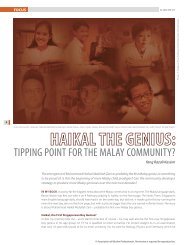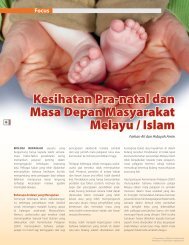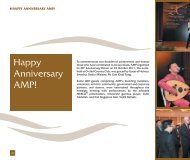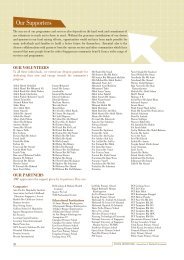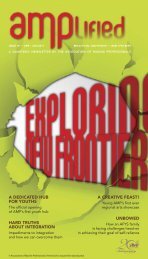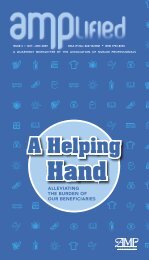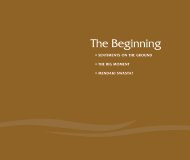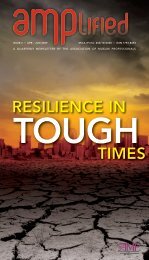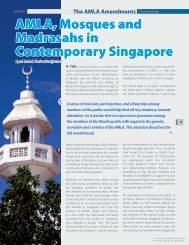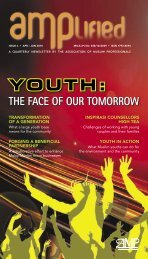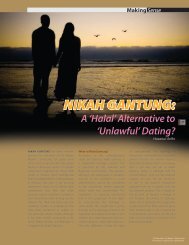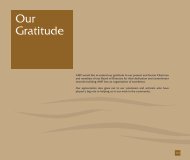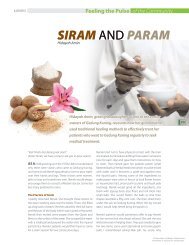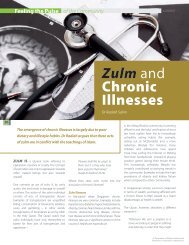The AMLA Amendments - Association of Muslim Professionals
The AMLA Amendments - Association of Muslim Professionals
The AMLA Amendments - Association of Muslim Professionals
Create successful ePaper yourself
Turn your PDF publications into a flip-book with our unique Google optimized e-Paper software.
KARYAWAN Issues / Community Is Singapore Ready for a Non-Chinese PM<br />
‘It could be held that the question now is no longer about whether it will<br />
happen but when it will happen.’<br />
Moreover, we found that the majority Chinese population <strong>of</strong><br />
Singapore expressed a readiness for a non-Chinese prime minister.<br />
No less than 91% were positive about a Malay PM, 94% for an<br />
Indian and 95% for a PM who fell within the “Other” category <strong>of</strong> our<br />
Chinese, Malay, Indian and Other (CMIO) administrative category<br />
<strong>of</strong> racial classification. From these two points, the “why nots” argue<br />
that Singaporeans will vote for the most capable party and, its party<br />
leader − Chinese or non-Chinese − can take the helm <strong>of</strong> leadership.<br />
For the “why not, but not now” camp, the argument is that Singapore<br />
is steadily progressing towards becoming a less race-conscious<br />
nation and this progress holds open the possibility for a non-Chinese<br />
PM some time in our collective future. However, unlike the “why<br />
nots”, this camp maintains that Singaporeans are mid-way through<br />
their journey and have not arrived at the destination as yet.<br />
This brings us to the “no” camp. Unpacked, the arguments within<br />
the “no” camp may be subdivided into two distinct positions. One<br />
position argues that Singapore will not have a non-Chinese PM<br />
because <strong>of</strong> the deeply-embedded and immutable race-conscious<br />
nature <strong>of</strong> Singaporeans. As such, the idea <strong>of</strong> a non-Chinese PM is<br />
quixotic or utopian at best. <strong>The</strong> second position holds that Singapore<br />
should not have a non-Chinese PM as he/she will be partial to his/<br />
her own race to the detriment to the rest <strong>of</strong> Singapore.<br />
Uniquely Singapore<br />
As this debate has been conducted in a mature and civil manner, it is<br />
certainly a sign <strong>of</strong> how far Singaporeans have come as a maturing polity.<br />
Unfortunately in this debate, those in the “no” camp, though applauded<br />
for sharing their views, have put forward untenable arguments.<br />
Firstly, with regard to the argument that Singaporeans are too raceconscious<br />
to support a non-Chinese PM, those in support <strong>of</strong> this<br />
point should consider their Singaporean history and the maturity <strong>of</strong><br />
the electorate. As pointed out in the debate thus far, David Marshall,<br />
a Jew, became Singapore’s first Chief Minister in 1955. This would<br />
suggest that Singaporeans have always been ready to accept a non-<br />
Chinese PM than given credit for. Furthermore, based on our survey,<br />
after 42 years <strong>of</strong> nation-building, it appears that inter-racial relations<br />
among Singaporeans have matured. While racial differences may<br />
still have bearing on their interaction patterns in the private sphere,<br />
Singaporeans’ commitment to communal harmony is demonstrated<br />
in their colour-blindness in the public sphere.<br />
This public/private division should not be a cause for concern.<br />
Arguably, tolerating the difference is perhaps the most viable option<br />
to sustaining social cohesion as it takes into account the reality that no<br />
society can completely purge itself <strong>of</strong> primordial sentiments. Hence,<br />
one could surmise that the majority <strong>of</strong> Singaporeans have internalised<br />
the essence <strong>of</strong> tolerance – the wisdom and civility to put aside<br />
personal cultural biases – to accept fellow Singaporeans <strong>of</strong> all races in<br />
the nation’s common spaces in the interest <strong>of</strong> social cohesion.<br />
Stable Majority<br />
Secondly, the argument that a minority PM will undoubtedly give<br />
preference to his/her own race when in power is dismissed by<br />
Singapore’s unique racial demographic and its overwhelming<br />
Chinese majority. Owing to Singapore’s significant Chinese majority,<br />
it would be electoral suicide for a minority PM to be inequitable<br />
between the races when implementing policies. It may be<br />
instructive here to consider a point made by then Cabinet Minister<br />
S. Rajaratnam in a 1967 parliamentary speech to illustrate the futility<br />
<strong>of</strong> communal politics for minorities in Singapore.<br />
Acknowledging the reality <strong>of</strong> an unequivocal majority community<br />
in Singapore, Rajaratnam maintained that “the minorities would<br />
forever remain a minority in Parliament – an ineffective minority<br />
– and forever play the role <strong>of</strong> just a permanent but ineffective<br />
opposition in the country... Any minority leader who tells his people<br />
that the united strength <strong>of</strong> his community can prevail over the<br />
strength <strong>of</strong> the majority is leading his people to perdition.”<br />
Extending this argument to the role <strong>of</strong> a Prime Minister, it is clear<br />
that there is little incentive for a minority head <strong>of</strong> government in<br />
a democracy to discriminate against the majority in the interest <strong>of</strong><br />
political survival at the next elections. In such a situation, a minority<br />
PM has little political choice but to be as even-handed as possible<br />
when in power.<br />
Not Whether, But When<br />
Let us consider all this in the context <strong>of</strong> PM Lee Hsien Loong’s recent<br />
comments on the issue at a Malay grassroots and community leaders<br />
meeting where he maintained that a non-Chinese PM is possible<br />
in the future. It could be held that the question now is no longer<br />
about whether it will happen but when it will happen. Interestingly<br />
for multiculturalism and social cohesion in Singapore, when it does<br />
happen, the uniqueness <strong>of</strong> our history, culture and demographics<br />
may ensure that all Singaporeans will be better for it.<br />
Yolanda Chin is Associate Research Fellow and Norman<br />
Vasu is Assistant Pr<strong>of</strong>essor at the S. Rajaratnam School<br />
<strong>of</strong> International Studies (RSIS), Nanyang Technological<br />
University. <strong>The</strong>y research on issues pertaining to the social<br />
fabric. This commentary also appeared in TODAY.<br />
31



